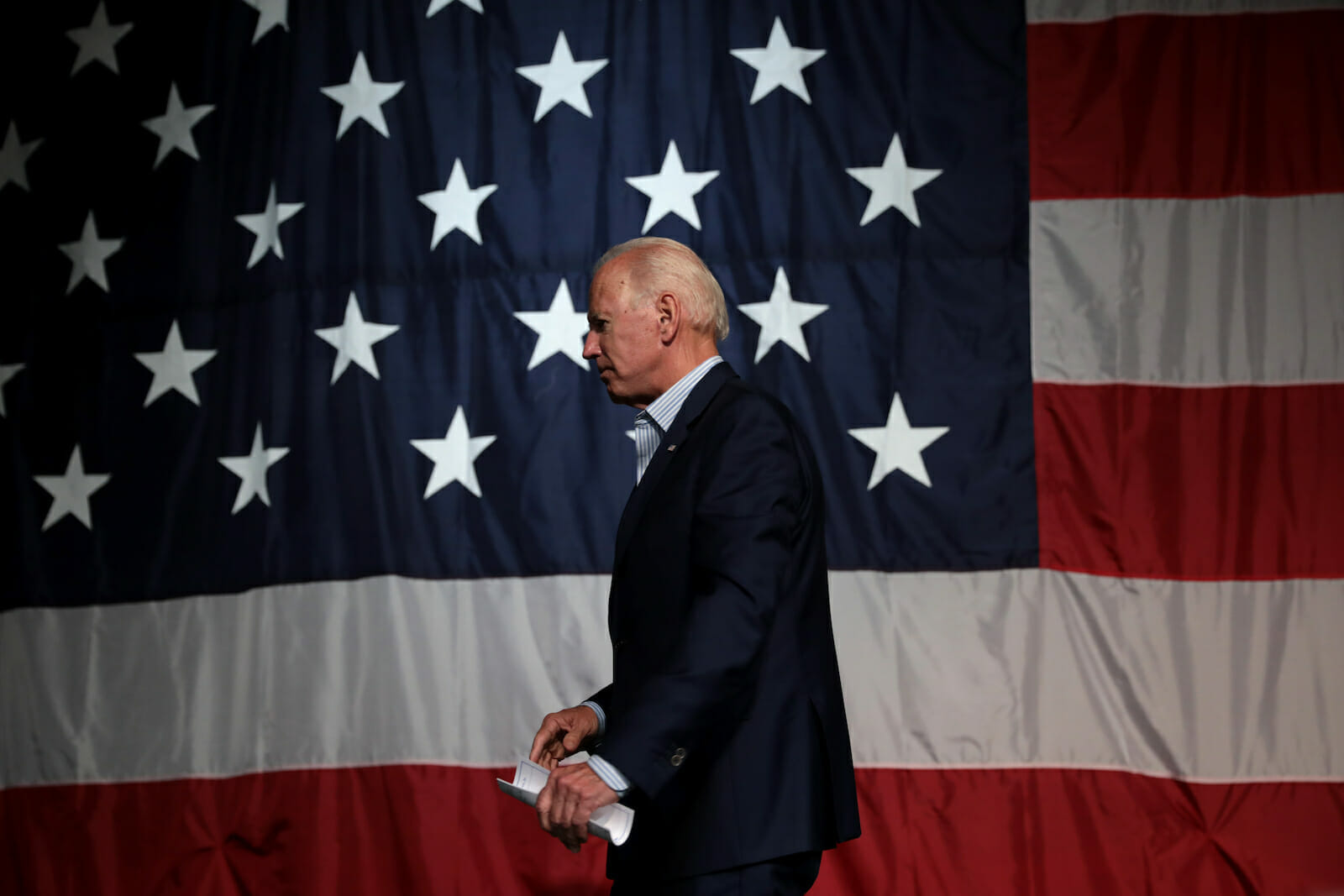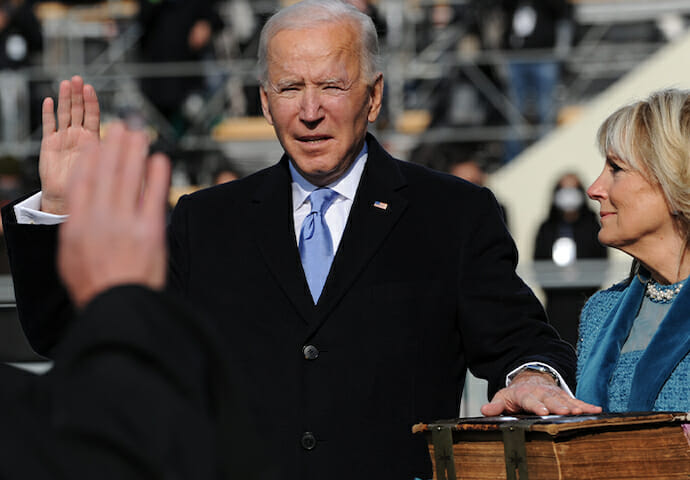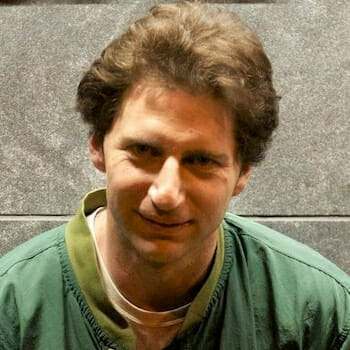
Biden’s Victory Brings Welcome Change for America’s Allies
In his inaugural address as the 46th President of the United States, Joe Biden recognized the challenges facing America, and the world. At midday on Jan. 20, Biden took to the podium at the Capitol after being sworn-in and articulated his plans as president — and his lasting commitment to renewed engagement with America’s allies.
“The world is watching — watching all of us today. So here’s my message for those beyond those borders. America has been tested, and we’ve come out stronger for it,” underscored Biden. “We will repair our alliances, and engage with the world once again. Not to meet yesterday’s challenges, but today’s and tomorrow’s challenges. And we will lead — not merely by the example of our power, but by the power of our example. We’ll be a strong and trusted power for peace, progress and security.”
“Yesterday’s challenges” were indeed perceived as alarming for many stalwart allies, which often felt scorned by the contentious Trump administration. The moniker “America First” caused the country to fray from some important longtime allies, and to break international commitments — and norms — that had been entrusted with longtime friends. Thus, Biden’s first phone calls as president were made to Canadian Prime Minister Justin Trudeau and Mexican President Andrés Manuel López Obrador.
“It’s not always going to be a perfect alignment with the United States,” Trudeau said after receiving Biden’s call. “That’s the case with any given president, but we’re in a situation where we are much more aligned on values and focus. I am very much looking forward to working with President Biden.”
In one of his first executive orders as president, Biden halted the construction of the Keystone XL oil pipeline. “Leaving the Keystone XL pipeline permit in place would not be consistent with my Administration’s economic and climate imperatives,” read Biden’s executive order. While Trudeau said he was “disappointed” by Biden’s decision, the two leaders spoke in broad terms on trade, defense, and climate issues.
Jens Stoltenberg, the NATO Secretary-General, also welcomed the Biden administration. “The bond between North America and Europe is the bedrock of our security, and a strong NATO is good for both North America and Europe,” he said. “For more than seventy years, our transatlantic Alliance has guaranteed freedom, peace, and security for our people. U.S. leadership remains essential as we work together to protect our democracies, our values and the rules-based international order.”
European leaders often showed great anxiety to Donald Trump’s hostile decorum, and his actions proved antithetical to what was believed as standard U.S. policies and values. These ideas were not lost on John Kerry, Biden’s Special Envoy on Climate Change. As Secretary of State, one of Kerry’s pillar achievements had been the Paris Agreement, which was formally signed in April of 2016, and dealt with issues pertinent to greenhouse-gas emission mitigation, and adaptation. 190 members of the UN Framework Convention on Climate Change remain parties to the agreement, with its main goal stating that each country must do its fair share in determining, planning, and regularly reporting on methods to mitigate global warming.

Just hours after his inauguration, Biden signed an executive action declaring that the U.S. will re-enter the Paris Agreement — something Trump had pulled the U.S. out of in 2017, though it took another three years for the country to formally withdraw from it.
Biden’s executive order also comes a few months after the second presidential debate in which he argued: “Climate change and global warming are an existential threat to humanity. We have a moral obligation to deal with it, and we are told by all the leading scientists in the world that we don’t have much time … My plan will provide millions of new good-paying jobs … Our health and our jobs are at stake.”
Trump countered that had his administration continued with the Paris Agreement, it would have “destroyed our businesses. I took us out because we were going to have to spend trillions of dollars, and we were treated very unfairly … I will not sacrifice tens of millions of jobs; thousands and thousands of companies because of the Paris Accords,” he said.
“We know with pain and some embarrassment that, for the last four years, the leader of our country chose to pull out of the agreement and frankly, engage in reckless behavior, and with respect to the future of people all over the world,” Kerry said in a remote message in a Keynote Session of the B20 2021 Inception Meeting on Jan. 21. This event was a global business forum so that the business community could make their voices heard among the G20’s group of countries.
“For the EU, the Biden administration’s [engagement with its allies] will certainly be a step in the right direction, especially [regarding] the Paris Agreement and with [the U.S. re-entering] the World Health Organization (WHO),” says Anguelina Piskova, the Brussels-based chief correspondent for Bulgarian National Radio.
“The fight for addressing climate change is a priority for [President of the European Commission] Ursula von der Leyen, and the decision of the Trump administration to withdraw from the Paris Agreement was not welcomed at all,” continues Piskova. “The procedure to [announce plans to withdraw] from WHO [during] the pandemic, was an exotic decision.” Piskova also reminds that “European Council President Charles Michel invited President Biden to a meeting with EU leaders, which eventually will be held at the same time as a [future] NATO meeting. Manfred Weber, who serves as the President of European People’s Party — the biggest in the EU Parliament — also suggested that Biden’s first European visit and his first speech should be held at the EU Parliament in Strasbourg — a symbolic town [of] reconciliation between Germany and France after the Second World War.”
Hours after Biden announced that the U.S. would rejoin the WHO, UN Secretary-General António Guterres stipulated that supporting the organization is absolutely critical to the world’s efforts for a better-coordinated response to COVID-19. The WHO, which was established in 1948, is a specialized agency by the UN with its stated goal and responsibility of fostering international public health. In April 2020, Trump pledged to halt U.S. funding for it, citing that it had “severely mismanaged and cover[ed] up the spread of the coronavirus.” Three months later, Trump formally notified the UN of his intent to withdraw the U.S. from the organization.
One of Biden’s chief executive actions as president was for the U.S. to re-enter the World Health Organization.
“I think that, for sure, there are very welcoming and rapid changes, like rejoining WHO and the Paris Agreement,” adds Teemu Matinpuro, who serves as the Executive Director of the Finnish Peace Committee. “Like we saw in Obama’s [tenure], fundamental changes did not happen [so swiftly] — except maybe with Obamacare. But, the EU is more than satisfied that the U.S. is back in the game — and to the different levels of negotiations. Of course, after Trump, it’s easier to make major differences for the better.”
In recent years, press freedom has been routinely under assault by regimented autocracies, which had never been forcefully rebuked by the Trump administration. In fact, Trump made it commonplace to oft-times mock, bully, and chide American reporters with unwarranted insults of “fake news,” if he did not receive flattering coverage. Organizations like Reporters Without Borders, Committee to Protect Journalists, and the European Journalism Observatory remain firm establishing protection for international media from governments’ overreach, and pending dangers that may seek to intimidate, detain, rough-up, and even attempt to kill reporters.
In countries like Russia, international correspondents with legitimate press credentials, and think tanks, which promote democratic aims, are labeled as “undesirables” and “foreign agents.”
“As of the end of December, the Russian Justice Ministry added five individuals to the list of foreign agent media,” says Oksana Chelysheva, an advocacy journalist in Helsinki, Finland. “They include human rights defender Lev Ponomarev, Radio Svoboda journalist Sergey Markelov, Pskovskaya Gubernia’s editor-in-chief Denis Kamalyagin, and St. Petersburg artist-activist Dariya Apakhonchich. This is the first time the Justice Ministry has recognized individual people as ‘foreign agent’ media. I personally know one of the five people who all of a sudden [had] been branded as a ‘foreign agent.’ The decision to include five people on this list has a truly chilling effect. This is a threat against anyone. It is not clear how the decision is made — by which body actually decides on it, how to appeal it, and whether it is possible to remove the name off the list.”
“As of now, it is all completely different as journalists do often write for media outside Russia and receive money for their work. Thus, the mere fact that you being a recipient of the payment for your article can be interpreted as serving the interests of a foreign state,” concludes Chelysheva.
Many pressing foreign policy issues loom large for President Biden as he assumes office, and this newfound optimism for the new administration has already given way to sheer pragmatic diplomacy. In addition to some of the aforementioned orders, Biden also plans to fulfill his campaign promise to include an extension on a federal freeze on evictions, and to ask federal agencies to extend a suspension on foreclosures on federally guaranteed mortgages. Biden will also provide relief to students with large education loans by continuing a suspension on federal student loan interest and principal payments for the next eight months.
“In a way, it takes a while, and we are back to where we were with Obama — so in a way, we’ve lost four years,” says Matinpuro. “I hope that tangible results will be seen soon, [such as] nuclear disarmament with Russia, Iran agreement, and as a minor issue with ‘Re-Obamazation’ of relations with Cuba. But many other issues [remain like] hurdles. Fundamental changes are needed with so many issues, [such as] war and peace, social equality, and climate change.”
